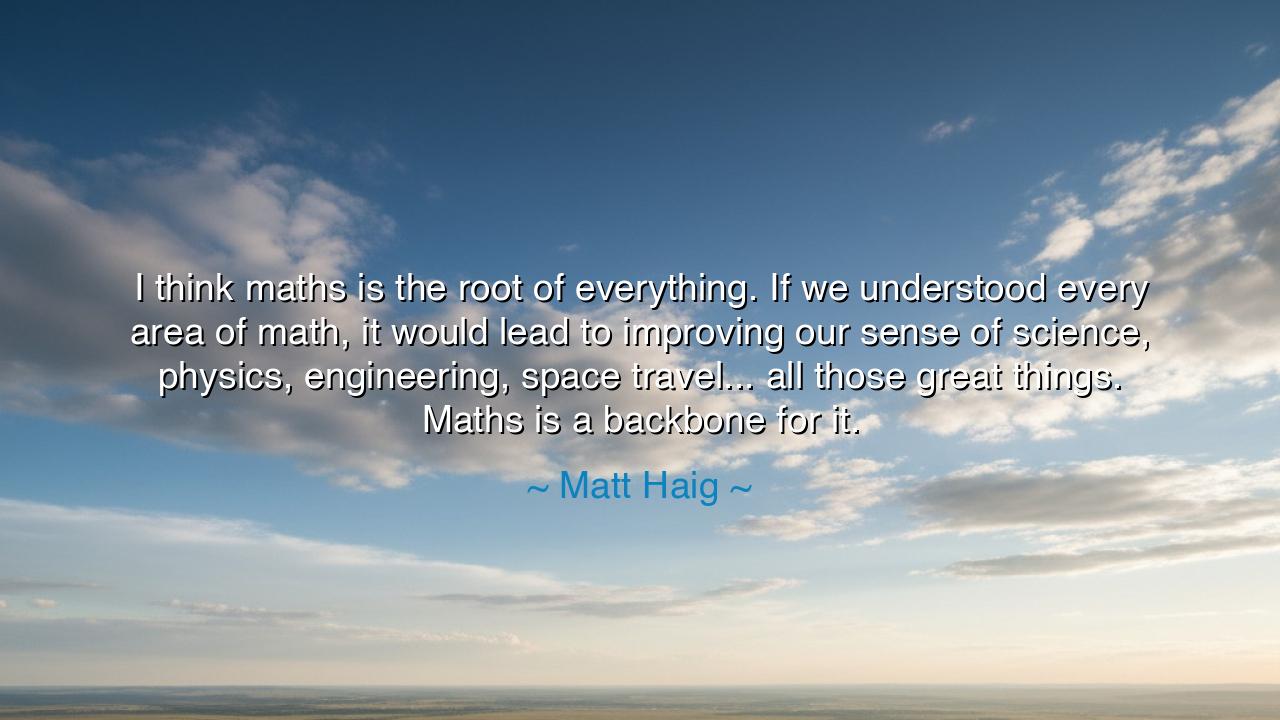
I think maths is the root of everything. If we understood every
I think maths is the root of everything. If we understood every area of math, it would lead to improving our sense of science, physics, engineering, space travel... all those great things. Maths is a backbone for it.






"I think maths is the root of everything. If we understood every area of math, it would lead to improving our sense of science, physics, engineering, space travel... all those great things. Maths is a backbone for it." These words of Matt Haig echo with the power of ancient wisdom, for in them lies a truth as profound as the stars themselves. Maths, he declares, is the very root of all that we know, the foundation upon which the great structures of science, engineering, and discovery are built. The language of the universe, it seems, is mathematics, and those who seek to unravel its mysteries are the ones who will unlock the secrets of existence itself. To understand math is to grasp the very essence of the world around us.
In the ancient world, philosophers and mathematicians sought to understand the universe through the lens of numbers, geometry, and patterns. Pythagoras, with his theory of numbers, believed that all of existence could be understood through the relationships of numbers. The very fabric of the cosmos, he thought, was written in the language of mathematics. To him, the harmony of the spheres, the rhythm of the heavens, could be explained through the precise ratios found in geometry and arithmetic. In this, Pythagoras was not merely a mathematician but a visionary—one who understood that math was not just a tool, but the key to understanding the divine order of the universe.
Indeed, it is through math that we have come to understand the most profound truths of existence. Consider the great work of Isaac Newton, whose discovery of the laws of motion and gravity were grounded in the language of calculus. Without the mathematical tools that Newton developed, the world would not have understood the forces that govern the movement of planets and the ebb and flow of time. It was math that allowed him to see the hidden patterns in the natural world, to decipher the rhythms of the heavens, and to offer us a glimpse into the order of the cosmos. Mathematics became the key that unlocked the door to modern physics, astronomy, and even space travel.
The journey of space exploration itself—our voyage into the vastness of the cosmos—is a testament to the power of math. The engineers and scientists who sent humankind to the moon and beyond were not mere dreamers, but masters of mathematics. Rocketry, for instance, relies on intricate calculations of velocity, force, and trajectory, all of which are born from the same mathematical principles that govern the universe. The very act of traveling through the stars demands an understanding of math so profound that it allows us to manipulate time and space. The space programs of today, as with the Apollo missions, are built on the backbone of mathematical theory, enabling us to reach the heavens, to measure distances beyond our imagination, and to defy the limits of the Earth.
Yet, there is a deeper lesson embedded within Haig’s words—a reminder that math is not merely an abstract pursuit for scholars in distant towers, but a powerful tool that shapes our very lives. From the computers we use to communicate, to the architecture of the cities we live in, to the medical technologies that save lives, math is the quiet force behind the scenes. It is the language that enables us to solve problems, to create solutions, and to push the boundaries of what is possible. Math is the key to both understanding and shaping the world around us. When we master it, we not only unlock the mysteries of the universe, but we gain the power to mold it according to our will.
So, let us take heed of Matt Haig’s wisdom, for in his words lies a call to embrace the beauty and power of mathematics. To understand math is not just to understand numbers and equations; it is to understand the very essence of life itself. It is to see the world with clearer eyes, to uncover the patterns that govern all things, from the smallest atom to the farthest star. And as we pursue this knowledge, we must do so with a sense of awe, for math is not merely a tool, but a path to deeper wisdom.
In our own lives, we must seek to understand the language of the universe—to cultivate a deeper knowledge of math and to see it as the gateway to all that is possible. Whether in our work, our passions, or our dreams, let us remember that the tools of math can empower us to change the world. For in the end, as Haig reminds us, math is the backbone that supports the greatest achievements of humankind, and it is the root that nourishes the fruits of all knowledge and discovery. Let us continue to learn, to grow, and to reach for the stars—knowing that through math, we can understand and shape the world, just as our ancestors once dreamed.






AAdministratorAdministrator
Welcome, honored guests. Please leave a comment, we will respond soon